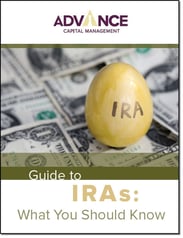IRAs for Self-Employed Workers
August 5th, 2020 | 2 min. read

A common perk of working for a company is a retirement plan. What about if you work for yourself? Will you have a harder time retiring when you decide to call it quits?
That’s a question on the minds of more and more workers, as technology makes it easier for people to be their own boss, whether as a small business owner or freelancer.
Nearly 30% of Americans said they were self-employed at some point for a given week in 2019, according to a survey by Intuit QuickBooks. By 2026, the Bureau of Labor Statistics projects the number of self-employed workers to grow by around 8% to more than 10 million.
This trend may be exacerbated by the COVID-19 pandemic as businesses reduce their workforces and physical footprints to cut costs.
A basic solution for self-employed workers saving for retirement is through an Individual Retirement Account (IRA), a type of tax-advantaged investment account in which you save and invest money to fund your retirement goals. Let’s look at a couple different self-employed IRA options.
SEP IRA
A SEP (Simplified Employee Pension) IRA is a type of traditional IRA for self-employed workers or small business owners who may have one or more employees. Contributions are made by the employer and are not required every year. The annual contribution limit is the lessor of up to 25% of the employee’s salary or $61,000 (2022).
Further, employers are required to contribute an equal percentage of each employee’s salary, including their own. One major benefit of the SEP IRA is that contributions are tax-deductible.
Small business owners should know that for an employee to be eligible for a SEP IRA, that person must be at least 21 years old, have been employed with the company three of the last five years and have earned at least $600 during the year.
SIMPLE IRA
The SIMPLE (Savings Incentive Match Plan for Employees) IRA is another type of traditional IRA commonly used by small businesses and self-employed workers. It works much like an employer-sponsored retirement plan.
SIMPLE IRAs provide great tax benefits. Contributions are tax-deductible and earnings grow tax deferred.
Unlike SEP IRAs, employees can make contributions. Those under age 50 can contribute up to $14,000 (2022) each year, and those age 50 or older can contribute up to $17,000 (2022). Employers are required to provide a 3% match or contribution of 2% of each eligible employee’s salary.
You are eligible to participate if you’ve earned at least $5,000 during any two years prior to the current year and expect to earn at least that amount in the current year.
As with any retirement account, it is best to keep the funds in place until you’re ready to retire. Withdrawals are taxed at your respective income rate in retirement. And early withdrawals, before age 59 ½, made within the first two years of participation may be subject to a 25% penalty.
One additional feature of the SIMPLE IRA is that you can roll over the fund into a traditional IRA after participating in the plan for two years.
Opening an IRA
You can open an IRA at a variety of financial institutions, including Advance Capital Management. You typically contribute money to the account directly from your paycheck. Then you purchase investments (mutual funds, individual stocks, bonds, etc.) to help grow that money to eventually withdraw as income in retirement.
The responsibility of creating your own retirement plan is a major responsibility. Fortunately, you don’t have to do it on your own. Working with a financial adviser can help to ensure that you’re making an informed and empowered decision for you and your financial future, as well as for your employees.
Whether you’re a stay-at-home parent, small business owner, freelancer or someone who just doesn’t like their 401(k), learn more about saving and investing in an IRA by downloading our guide, IRAs: What You Should Know.
Advance Capital Management is a fee-only RIA serving clients across the country. The Advance Capital Team includes financial advisers, investment managers, client service professionals and more -- all dedicated to helping people pursue their financial goals.


